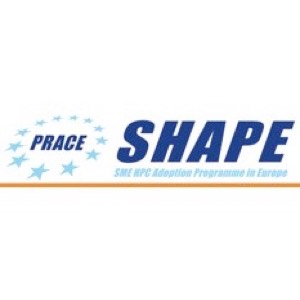 PRACE has announced that following the 9th Call for applications to SHAPE, five more SMEs will be able to start working with PRACE to gain access to HPC expertise and resources, expand their HPC experience and ultimately enhance their business. Of these five SMEs, one is from Poland and one from Luxembourg, both countries new to SHAPE. Two of the projects are from start-up companies.
PRACE has announced that following the 9th Call for applications to SHAPE, five more SMEs will be able to start working with PRACE to gain access to HPC expertise and resources, expand their HPC experience and ultimately enhance their business. Of these five SMEs, one is from Poland and one from Luxembourg, both countries new to SHAPE. Two of the projects are from start-up companies.
SHAPE is a pan-European program that promotes High Performance Computing adoption by SMEs (small and medium-sized enterprises), supported as part of the PRACE initiative. So far, SHAPE has helped 45 companies to use HPC, allowing them to benefit from using HPC in their business.
The projects cover topics such as deep learning, plasma simulation tool, CFD simulations of submersion cooling for HPC, cardiovascular stent design and fire prevention through the use of machine learning and big data.
NIER Ingegneria ‘Deep Learning for Video and Time Series Analysis’
The aim of the project is to implement a Deep Neural Network (DNN) to classify human tasks and compute mental workloads based on eye-tracking (ET) and electroencephalogram (EEG) data combined with video analysis. The image data analysis involved is highly computationally and data-intensive, hence the need for parallel processing. The PRACE partner will profile and benchmark the code to identify bottlenecks and attempt to implement a parallelised version which will run on GPUs, Intel Phi cores, or on a multi-core or multi-node CPU system.
NIER will set up and run its project at PRACE Member CINECA, Bologna, Italy. NIER has been an engineering consultant company for more than 40 years and employs around 125 people. The SME already has a collaboration with DICAM at the University of Bologna.
SPARC Industries ‘PLASTEC’
SPARC Industries is a relatively new SME which has existed for 18 months. It has two core activities: The development of a novel space propulsion system and the development and commercialisation of a plasma simulation tool for space and nonspace flows at very low pressures, with the latter being the focus of this proposal.
The SME has an existing application and they want to investigate to what extent running on an HPC platform can increase its performance. The aim is to run on anything from a single-node/single-GPU system up to multi-node/multi-GPU system with the most appropriate platform being decided during the project. The aim is to decrease the runtime by at least 2 orders of magnitude. This time saving is key for the SME as the time saving for customers is likely to boost revenues for the SME.
SPARC will run its project at PRACE Member University of Luxembourg, Luxembourg.
Submer Immersion Cooling (Spain) ‘CFD Simulations in HPC Immersion Cooled’
Submer Immersion Cooling, designs builds and installs Liquid Immersion cooling solutions for datacentres. The SME wishes to increase its knowledge of CFD simulations in an HPC environment and to try out HPC software to carry out their simulations in a scalable manner. Improving the performance of the software should lead to a better design of the SME’s cooling solution and way the coolant flows within the containment tank, in turn improving heat dissipation and reliability of the hardware being cooled, thus providing a better product to customers.
The Submer project will run at PRACE Member BSC, Barcelona, Spain.
LVD Biotech, S.L. (Spain) “Improvement of cardiovascular stent design through advanced numerical simulation”
BSC will collaborate with LVD Biotech, a company that develops advanced medical devices and therapies for cardiovascular disorders. The project’s focus will be on modelling stents and for this, they will be using BSC’s Ayla multi-physics code, the same one used by wind generator simulation. The project will run the simulations at PRACE Member BSC, Barcelona, Spain.
Neuralbit Technologies ‘FireFinder’
Neuralbit Technologies is a new start-up focussing on big data, machine learning, optimisation and modern ICT systems. The company offers a system which provides early detection of forest fires based on input from a network of sensors which themselves detect gases and dust emitted during a fire. The data helps to build up a prediction of the exact location, scope and likely development of the fire. The project here is to develop an algorithm based on Machine Learning to do this. The aim is to develop a system with functionality which no existing fire detection system currently has leading to increased sales and company development.
The simulations of the project ‘FireFinder’ will be supported by PRACE Member PSNC, Poznań, Poland.
The SHAPE projects awarded from the 9th Call span a wide range from engineering to health care to highly complex plasma simulations and Machine Learning with the focus on bringing innovative products suitable to the market in the near future.
This story appears here as part of a cross-publishing agreement with Scientific Computing World.




